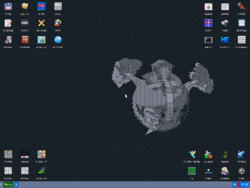Main Page: Difference between revisions
Jump to navigation
Jump to search
Asiekierka (talk | contribs) No edit summary |
Asiekierka (talk | contribs) No edit summary |
||
| Line 16: | Line 16: | ||
}} | }} | ||
KolibriOS is an [http://en.wikipedia.org/wiki/Open-source_software open source] [http://en.wikipedia.org/wiki/Operating_system operating system] with a [http://en.wikipedia.org/wiki/Monolithic_kernel monolithic] [http://en.wikipedia.org/wiki/Preemption_(computing) preemptive] [http://en.wikipedia.org/wiki/Kernel_(computer_science) kernel], video drivers, for [http://en.wikipedia.org/wiki/32-bit 32-bit] [http://en.wikipedia.org/wiki/x86_architecture x86 | KolibriOS is an [http://en.wikipedia.org/wiki/Open-source_software open source] [http://en.wikipedia.org/wiki/Operating_system operating system] with a [http://en.wikipedia.org/wiki/Monolithic_kernel monolithic] [http://en.wikipedia.org/wiki/Preemption_(computing) preemptive] [http://en.wikipedia.org/wiki/Kernel_(computer_science) kernel], video drivers, for [http://en.wikipedia.org/wiki/32-bit 32-bit] [http://en.wikipedia.org/wiki/x86_architecture x86] computers, developed and maintained by The KolibriOS Project Team. KolibriOS is a fork of [http://en.wikipedia.org/wiki/MenuetOS MenuetOS], written entirely in [http://en.wikipedia.org/wiki/FASM Assembler/FASM]. However, [http://en.wikipedia.org/wiki/C C], [http://en.wikipedia.org/wiki/C++ C++], [http://en.wikipedia.org/wiki/Free_Pascal Free Pascal] and [http://en.wikipedia.org/wiki/Forth Forth], as well as other compilers, can also be used in application development.<br /> | ||
English, Russian, Spanish and Italian versions are available. | English, Russian, Spanish and Italian versions are available. | ||
Revision as of 19:48, 18 March 2013
| KolibriOS | |

| |
 KolibriOS desktop | |
| Website: | www.kolibrios.org |
| Developed by: | KolibriOS Project Team |
| License: | GPL |
| Kernel type: | Monolithic kernel |
| Working state: | Active |
KolibriOS is an open source operating system with a monolithic preemptive kernel, video drivers, for 32-bit x86 computers, developed and maintained by The KolibriOS Project Team. KolibriOS is a fork of MenuetOS, written entirely in Assembler/FASM. However, C, C++, Free Pascal and Forth, as well as other compilers, can also be used in application development.
English, Russian, Spanish and Italian versions are available.
IMPORTANT: Help KolibriOS development by working on ideas from the Google Summer of Code 2013 list!
| Home | FAQ |
|---|---|
| Forum | Documentation |
| Nightly Builds | Wanted Features |
| Bug Tracker | Changelog |
| Source Repository | Applications |
| File Repository | Hardware Support |
| GSoC Information | All categories |
KolibriOS Features
- Insanely fast. As an Assembler-coded operating system, it does not use anything beyond what it needs to run. Even VESA does not cause any slowdowns.
- Bloatless. 90% of the software for Kolibri fits on a single floppy disk.
- Compatible. It boots from anything, including NTFS drives and even from Windows itself. It supports FAT16/32, ext2/3/4 and CDFS. We are even compatible with NTFS!
- Graphical. Despite being smaller than Linux's kernel, it manages to pack in a fully working graphics interface and a base of applications for you to use.
- Easy to develop. KolibriOS comes with all the software you need to write software for it out of the box.
- Lightweight. Kolibri runs on anything that has a Pentium and eight megabytes of RAM.
- Comes with a development kit (code editor with FASM macro-assembler integrated).
Branches